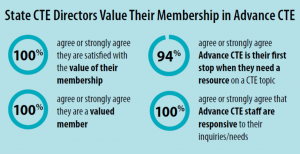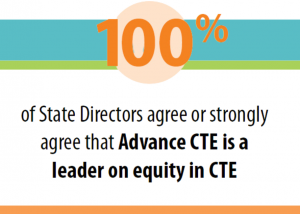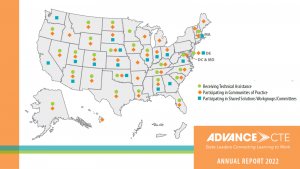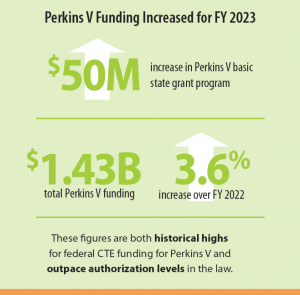Lawmakers in both chambers returned to Capitol Hill this week following an extended July 4th recess period. In the House, the Appropriations Committee advanced a new funding measure proposing a funding increase for Career Technical Education (CTE) while proposing significant cuts to many other education and workforce development programs.
House Appropriations Committee Advances FY25 Funding Proposal
 The House Appropriations Committee moved forward this week with formal consideration of its federal fiscal year 2025 (FY25) Labor-HHS-ED appropriations bill. The legislation proposes a $10 million increase for the Carl D. Perkins Career and Technical Education Act (Perkins V). A related committee report also highlights the existing limitations Perkins V places on federal regulations and requests that the U.S. Department of Education (ED) explain why new regulations for Perkins V are needed at this time and the scope of these forthcoming new rules. In recent weeks, ED has indicated that these rules would now be issued in November of this year rather than in August. Advance CTE remains significantly concerned regarding this issue given the significant disruptions new Perkins V implementation rules would cause at this time.
The House Appropriations Committee moved forward this week with formal consideration of its federal fiscal year 2025 (FY25) Labor-HHS-ED appropriations bill. The legislation proposes a $10 million increase for the Carl D. Perkins Career and Technical Education Act (Perkins V). A related committee report also highlights the existing limitations Perkins V places on federal regulations and requests that the U.S. Department of Education (ED) explain why new regulations for Perkins V are needed at this time and the scope of these forthcoming new rules. In recent weeks, ED has indicated that these rules would now be issued in November of this year rather than in August. Advance CTE remains significantly concerned regarding this issue given the significant disruptions new Perkins V implementation rules would cause at this time.
Despite these positive aspects of the House’s FY25 funding proposal, the legislation also envisions significant funding reductions for a wide range of education and workforce development programs. Advance CTE and the Association for Career and Technical Education (ACTE) issued a statement earlier this week in response to the proposal outlining concerns with these other elements of the legislation. Meanwhile, FY25 funding efforts in the Senate are beginning to get underway and are expected to take a different direction than the House’s vision for FY25 funding for education and workforce development. As these efforts continue to take shape, Advance CTE will continue to advocate for a strengthened investment in CTE via Perkins V’s state grant program.
Lawmakers Request Teacher Shortage Information from ED
This week, a group of Democratic House lawmakers led by Rep. Krishnamoorthi (D-IL) sent a letter to the U.S. Department of Education requesting information about ongoing efforts to collect more robust data on teacher shortages in critical areas such as CTE. The letter led by Krishnamoorthi argues that “With better, more robust data, we can begin to help address root causes and underlying issues that are causing shortages in these critical areas of the educational continuum.”
House Hosts Education Showcase
Just before the July 4th recess period, the House Education and the Workforce Committee held an “Artificial Intelligence (AI) in Education” event to highlight how this emerging technology can improve learning and education more generally. The showcase featured exhibits from a number of companies with AI solutions, including Microsoft, IBM, Google, and others. “This showcase will give participants the opportunity to highlight the first-hand uses and benefits of incorporating AI into education to prepare the next generation for success in the 21st century economy,” Chair Foxx said ahead of the event. House CTE Caucus Co-chair Suzanne Bonamici (D-OR) also provided remarks at the event highlighting the potential for AI to spur further innovation in CTE.
Chair Foxx Issues ED Regulatory Oversight Letter
This week, House Education and Workforce Committee Chair Virginia Foxx (R-NC), along with House Committee On Oversight and Accountability Chair James Comer (R-KY) issued a letter to several federal agencies, including the U.S. Department of Education, requesting information regarding the plans to enforce existing regulations and promulgate new rules in the future. The letter comes following a landmark Supreme Court ruling which is widely expected to significantly limit the ability for federal agencies to issue new federal regulations.
GAO Publishes New Report on K-12 Student Arrest Rates
This week the Government Accountability Office (GAO) issued a new report that examined data from the U.S. Department of Education’s Office of Civil Rights (OCR) regarding K-12 student arrest and police referral rates. These data were examined based on learners’ race, ethnicity, gender, and disability status. It found that Native Hawaiian/Pacific Islander, Black, and American Indian/Alaska Native learners were arrested at rates 2-3 times higher than their White counterparts. These disparities grew larger when factoring in disability status. The report recommends that these data be further disaggregated to support a better understanding of the intersection of K-12 schools and police interactions.
OET Publishes AI Guidance
Earlier this week, the U.S. Department of Education’s Office of Education Technology (OET) published long anticipated guidance for education technology companies for developing AI solutions for educational purposes. The guide comes in response to President Biden’s October 30, 2023 Executive Order on the Safe, Secure, and Trustworthy Development and Use of Artificial  Intelligence, which Advance CTE shared last fall. The guidance provides recommendations for the thoughtful and safe use of AI for effectively designing and implementing AI tools in education, including the potential use of AI to support learners navigating education and career pathways.
Intelligence, which Advance CTE shared last fall. The guidance provides recommendations for the thoughtful and safe use of AI for effectively designing and implementing AI tools in education, including the potential use of AI to support learners navigating education and career pathways.
Steve Voytek, Policy Advisor


 Lawmakers Include Focus on Appropriations and WIOA in Next Work Period
Lawmakers Include Focus on Appropriations and WIOA in Next Work Period 
 Advance CTE is a national leader in equipping CTE leaders to build more equitable programs and systems for each learner.
Advance CTE is a national leader in equipping CTE leaders to build more equitable programs and systems for each learner. 
 Advance CTE’s strong reputation among federal policymakers delivered increases for Strengthening Career and Technical Education for the 21st Century Act (Perkins V).
Advance CTE’s strong reputation among federal policymakers delivered increases for Strengthening Career and Technical Education for the 21st Century Act (Perkins V).  In 2022, Advance returned to in-person events while also delivering virtual events in new formats, including a three-part June Meeting Series and fireside chat featuring U.S. Department of Education Assistant Secretary Office of Career, Technical and Adult Education Dr. Amy Loyd.
In 2022, Advance returned to in-person events while also delivering virtual events in new formats, including a three-part June Meeting Series and fireside chat featuring U.S. Department of Education Assistant Secretary Office of Career, Technical and Adult Education Dr. Amy Loyd.